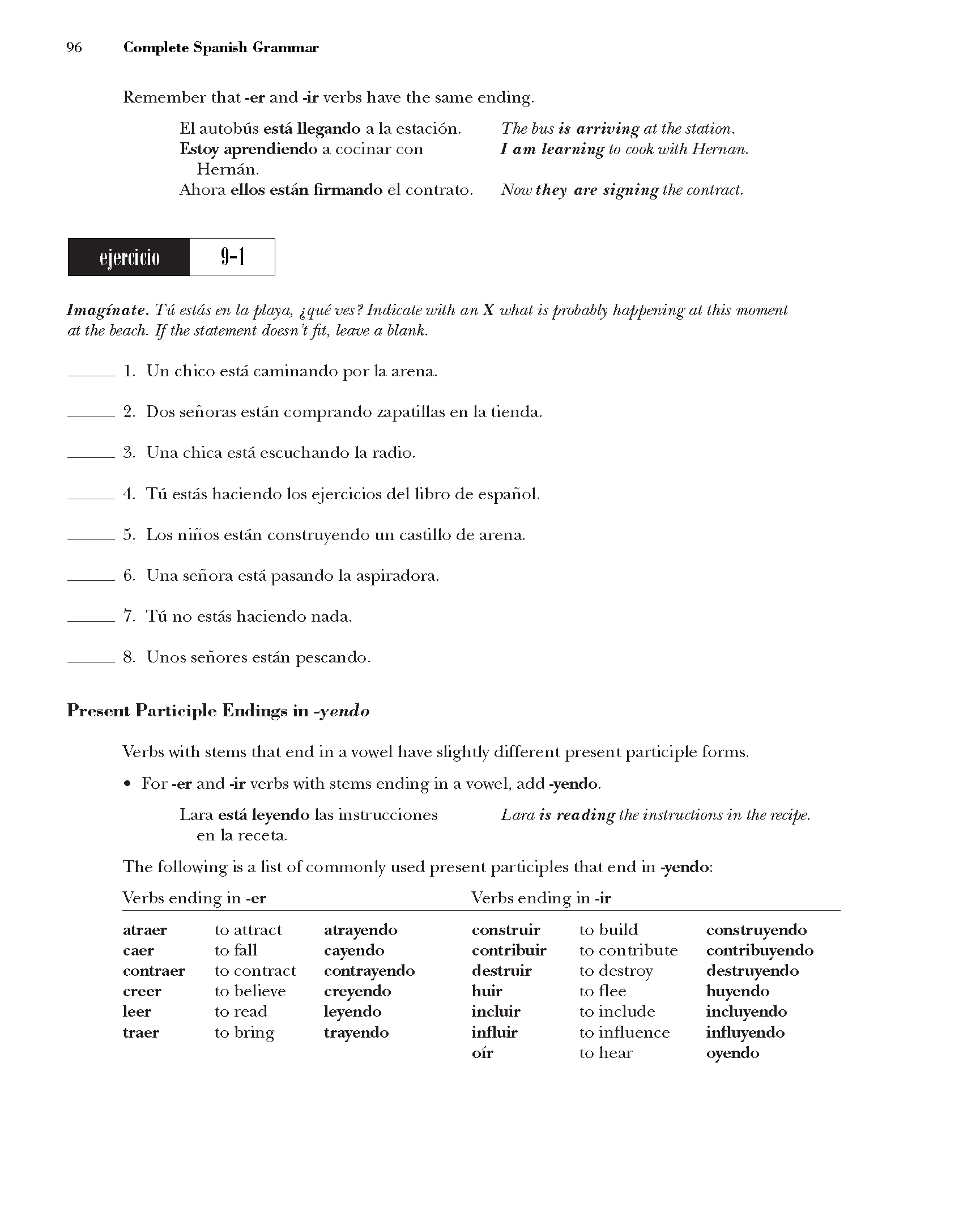CSG107

96
Complete Spanish Grammar
Remember that -er and -ir verbs have the same ending.
The bus is arriving at the station. lam learning to cook with Hernan.
Now they are signing the contract.
El autobus esta llegando a la estación. Estoy aprendiendo a cocinar eon Hernan.
Ahora ellos estan firmando el eon trato.
ejercicio
Imaginate. Tu estds en la playa, ique ves? Indicate with an X what is probably happening at this moment at the beach. If the statement doesntfit, leave a blank.
_ 1. Un chico esta caminando por la arena.
_ 2. Dos seńoras estan comprando zapatillas en la tienda.
_ 3. Una chica esta escuchando la radio.
_ 4. Tu estas haciendo los ejercicios del libro de espańol.
_ 5. Los nińos estan construyendo un castillo de arena.
_ 6. Una seńora esta pasando la aspiradora.
_ 7. Tu no estas haciendo nada.
_ 8. Unos seńores estan pescando.
Present Participle Endiiigs in -yendo
Yerbs with stems that end in a vowel have slightly different present participle forms.
• For -er and -ir verbs with stems ending in a vowel, add -yendo.
Lara esta leyendo las instrucciones Lara is reading the instructions in the recipe.
en la receta.
The following is a list of commonly used present participles that end in -yendo: Yerbs ending in -er Yerbs ending in -ir
|
atraer |
to attract |
atrayendo |
construir |
to build |
construyendo |
|
caer |
to fali |
cayendo |
contribuir |
to contribute |
contribuyendo |
|
contraer |
to contract |
contrayendo |
destruir |
to destroy |
destruyendo |
|
creer |
to believe |
creyendo |
huir |
to flee |
huyendo |
|
leer |
to read |
leyendo |
incluir |
to include |
incluyendo |
|
traer |
to bring |
trayendo |
influir |
to influence |
influyendo |
|
oir |
to hear |
oyendo |
oir
Wyszukiwarka
Podobne podstrony:
CSG107 96 Complete Spanish Grammar Remember that -er and -ir verbs have the same ending. The bus is
CSG107 96 Complete Spanish Grammar Remember that -er and -ir verbs have the same ending. The bus is
CSG127 116 Complete Spanish Grammar Remember that: • all auxiliary (haber) futurę
CSG143 Complete Spanish Grammar Notę that there are two parts or clauses (clausulas) in the precedin
CSG053 42 Complete Spanish Grammarejercicio Un misterio. Escńbe en el posado. Change the verb in ita
CSG167 156 Complete Spanish Grammar wants to find in ajournalist. Finally, in the last example, dond
CSG205 194 Complete Spanish Grammar • Nouns designating professions and individuals may end in -a, -
CSG235 224 Complete Spanish Grammar 7. No, tu eres 8. Ahora Laura va a recibir (the oldest) de tu fa
CSG157 146 Complete Spanish GrammarWlieii Is the Present Perfeet Subjunctive Used in Spanish? You re
więcej podobnych podstron